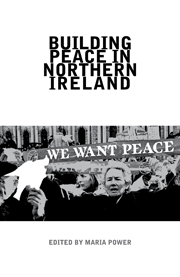Book contents
- Frontmatter
- Contents
- Acknowledgements
- Contributors
- 1 Introduction: Peacebuilding in Northern Ireland
- 2 Understanding the Role of Non-aligned Civil Society in Peacebuilding in Northern Ireland: Towards a Fresh Approach
- 3 The Role of Civil Society in Promoting Peace in Northern Ireland
- 4 The Contribution of Integrated Schools to Peacebuilding in Northern Ireland
- 5 Providing a Prophetic Voice? Churches and Peacebuilding, 1968–2005
- 6 ‘Peace Women’, Gender and Peacebuilding in Northern Ireland: From Reconciliation and Political Inclusion to Human Rights and Human Security
- 7 Encumbered by Data: Understanding Politically Motivated Former Prisoners and the Transition to Peace in Northern Ireland
- 8 Loyalism and Peacebuilding in the 2000s
- 9 Civil Society, the State and Conflict Transformation in the Nationalist Community
- 10 Examining the Peacebuilding Policy Framework of the Irish and British Governments
- 11 Building Peace and Crossing Borders: The North/South Dimension of Reconciliation
- 12 Peace Dividends: The Role of External Aid in Peacebuilding
- Index
11 - Building Peace and Crossing Borders: The North/South Dimension of Reconciliation
- Frontmatter
- Contents
- Acknowledgements
- Contributors
- 1 Introduction: Peacebuilding in Northern Ireland
- 2 Understanding the Role of Non-aligned Civil Society in Peacebuilding in Northern Ireland: Towards a Fresh Approach
- 3 The Role of Civil Society in Promoting Peace in Northern Ireland
- 4 The Contribution of Integrated Schools to Peacebuilding in Northern Ireland
- 5 Providing a Prophetic Voice? Churches and Peacebuilding, 1968–2005
- 6 ‘Peace Women’, Gender and Peacebuilding in Northern Ireland: From Reconciliation and Political Inclusion to Human Rights and Human Security
- 7 Encumbered by Data: Understanding Politically Motivated Former Prisoners and the Transition to Peace in Northern Ireland
- 8 Loyalism and Peacebuilding in the 2000s
- 9 Civil Society, the State and Conflict Transformation in the Nationalist Community
- 10 Examining the Peacebuilding Policy Framework of the Irish and British Governments
- 11 Building Peace and Crossing Borders: The North/South Dimension of Reconciliation
- 12 Peace Dividends: The Role of External Aid in Peacebuilding
- Index
Summary
You cannot really address the issue of the conflict without addressing the issue of cross-border communication and cross-border co-operation … Cross-border co-operation provides an opportunity to give us a totally new perspective on what it is like to live in a region emerging from conflict.
The Irish border was the thread that ran throughout the Agreement signed on Good Friday 1998 – it was there in the prime negotiating role of the British and Irish governments, in the casting line between ‘unionist’ and ‘nationalist’, and in the three strands of institutionalised cooperation between politicians divided over and by the border between Northern Ireland and the Republic of Ireland. But where should we metaphorically place the border in the task of building peace? As the well-respected public official who has played a major part in north/south cooperation since 1998 notes in the interview extract quoted above, not only is the cross-border dimension crucial to resolving conflict, it also offers a fresh vision of the post-Agreement landscape. This is the premise from which we will examine the nature of cross-border cooperation on the island of Ireland, specifically as it has been connected to the goals of peace and reconciliation.
Peacebuilding has been defined as ‘[a] process that establishes peace and prevents violence from continuing or re-emerging by addressing the root causes and the consequences of conflict.’ In this chapter we consider the role of cross-border cooperation as means of realising the goal of building peace.
- Type
- Chapter
- Information
- Building Peace in Northern Ireland , pp. 191 - 208Publisher: Liverpool University PressPrint publication year: 2011



